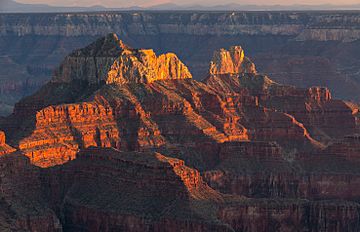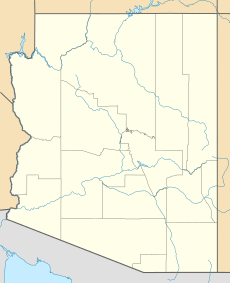Brahma Temple (Grand Canyon) facts for kids
Quick facts for kids Brahma Temple |
|
|---|---|

North aspect at sunset
|
|
| Highest point | |
| Elevation | 7,551 ft (2,302 m) |
| Prominence | 1,468 ft (447 m) |
| Isolation | 3.97 mi (6.39 km) |
| Parent peak | Oza Butte (8,068 ft) |
| Geography | |
| Location | Grand Canyon Coconino County, Arizona, US |
| Parent range | Kaibab Plateau Colorado Plateau |
| Topo map | USGS Phantom Ranch |
| Type of rock | Coconino Sandstone |
| Climbing | |
| First ascent | May 15, 1968 |
| Easiest route | class 4 climbing |
Brahma Temple is a tall mountain peak located in the amazing Grand Canyon. It stands 7,551 feet (2,302 meters) high. You can find it in Coconino County, Arizona, in the USA.
This peak is about six miles (10 km) north of a popular spot called Yavapai Point. That's on the South Rim of the canyon. It's also 4.5 miles south of Bright Angel Point on the North Rim. Brahma Temple towers a huge 5,000 feet (1,500 meters) above Phantom Ranch. Phantom Ranch is a famous spot deep inside Bright Angel Canyon.
Other peaks nearby include Zoroaster Temple, which is one mile to the south. Deva Temple is 1.5 miles to the north. The highest peak nearby is Oza Butte, four miles to the north.
Brahma Temple gets its name from Brahma. Brahma is known as the creator of the universe in Hindu beliefs. Clarence Dutton started the tradition of naming Grand Canyon features after gods and goddesses. The U.S. Board on Geographic Names officially adopted this name in 1906.
The first people to climb to the very top of Brahma Temple were Donald Davis and Clarence "Doc" Ellis. They made their climb on May 15, 1968. They traveled 12 miles and climbed 5,071 feet (1,546 meters) from Phantom Ranch. They reached the summit and returned in just 14 hours.
Rock Formations of Brahma Temple
The very top of Brahma Temple is made of a cream-colored rock called Coconino Sandstone. This sandstone forms steep cliffs. It has a cap of Kaibab Limestone on top.
The Coconino Sandstone is one of the younger rock layers in the Grand Canyon. It was formed about 265 million years ago. Back then, it was sand dunes, like those you might see in a desert today.
Below the Coconino Sandstone, you'll find the Hermit Formation. This layer forms slopes. Underneath that is the Supai Group, which formed between 323 and 299 million years ago. Even further down is the Redwall Limestone layer.
Rainwater that falls on Brahma Temple flows south. It drains into the Colorado River. This water travels through Bright Angel Creek on the west side of the peak. It also flows through Clear Creek on the east side.
Gallery
 | Valerie Thomas |
 | Frederick McKinley Jones |
 | George Edward Alcorn Jr. |
 | Thomas Mensah |









